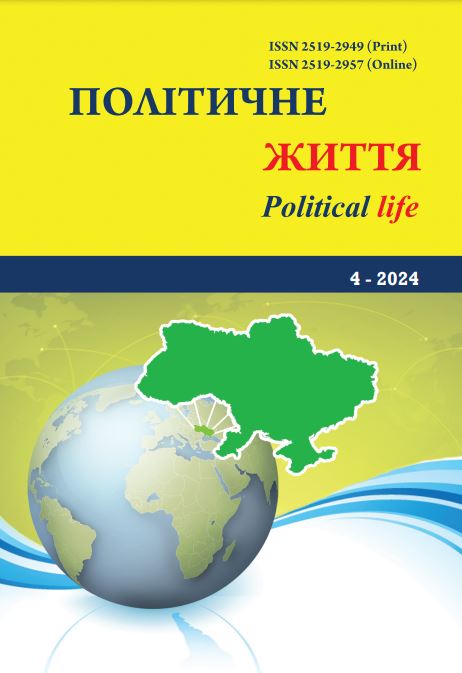Electoral behaviour as a special ‘slice’ of political behaviour
DOI:
https://doi.org/10.31558/2519-2949.2024.4.9Keywords:
political participation, political engagement, political behaviour, political institution, electorate, elections, legitimisationAbstract
The article deals with the main issues of political analysis of electoral behaviour in the system of the political behaviour of citizens. It is proved that many approaches to understanding political behaviour have yet to emerge to date. All seven approaches, which the authors of the publication focused on, are diverse, indicating the complex nature of political behaviour, uncertainty, and versatility. It is noted that there is no general methodology for studying electoral behaviour today. Sociologists, political scientists, and social psychologists offer their own methodological approaches, which differ significantly in terms of levels, content, and nature. In the article, the authors draw attention to three such methodological approaches: sociological, socio-psychological, and rational. They are different in their characteristics, but all agree that electoral behaviour is one of the forms of manifestation of political behaviour of individuals when they delegate their powers to the elected authorities and its peculiarity is that citizens participate in campaigning actions directly at elections. The authors prove that the three theoretical approaches to the study of electoral behaviour (sociological, socio-psychological, rational-instrumental) have their advantages and disadvantages, but they can be used to characterise electoral behaviour in full democracies, taking into account the changes that are taking place in them. The comparative analysis carried out in the article shows that in the system of political practices, a real paradigm for generalising the concept and modelling electoral behaviour can be found in the future. New approaches to the analysis and systematic explanation of the dynamics of the structure of electoral attitudes, forecasting electoral behaviour, and disclosure of technologies of influence on voters are scattered and still lack an empirical basis, but new research in this area could combine the existing knowledge on this issue and become the basis for synthesis and integration of new knowledge, which will help to solve the problem of disclosure of dynamic internal mechanisms of electoral behaviour and the possibilities of its forecasting
References
Бульбенюк С., Гапоненко В. Роль малих партій у політичному процесі у контексті парламентських виборів 2021 року. Політичні партії і вибори: українські та світові практики: зб. ст. і тез за результатами міжнародної наукової конференції «Малі політичні партії та актори у політичному процесі на регіональному та локальному (субнаціональному) рівнях: Україна і світ. Львів: ЛНУ ім. Івана Франка, 2022. Вип. 6. С.106–118.
Гапоненко В. А. Демократизація виборчого законодавства: рекомендації ЄС та стан їхнього виконання. Адаптація національного законодавства відповідно до Угоди про асоціацію з Європейським Союзом: наукова монографія. К.: Видавничий центр «Кафедра», 2019. С. 195–203.
Гапоненко В. А. Система інституційних чинників політичної демократизації в Україні: монографія. Київ : КНЕУ, 2020. 311c.
Гончарук-Чолач Т. В. Інтенції дослідження соціальної нерівності та стратифікації від античності до сьогодення. Гілея: науковий вісник. 2020. Вип. 157. С. 35-41.
Гончарук-Чолач Т., Гурик М., Джугла Н. Локалізація політики в контексті сучасних наукових досліджень. Гілея: науковий вісник. 2022. Вип. 167-168. С. 48-52.
Гончарук-Чолач Т., Джугла Н. Політична соціологія: навчальний посібник. Тернопіль: ТНЕУ «Економічна думка», 2018. 234 с.
Науменко О. М. Вплив виборчого процесу на механізми інкорпорації політико-управлінської еліти України. Науковий часопис Національного педагогічного університету імені М. П. Драгоманова. Серія 22. Політичні науки та методика викладання соціально-політичних дисциплін. Випуск 29: збірник наукових праць. Київ: Вид-во НПУ імені М. П. Драгоманова, 2020. С. 129–137
Шинкаренко О. Маркетингова модель електоральної поведінки: сутність та основні характеристики. Український соціологічний журнал. 2013. № 1–2. С. 87–91.

